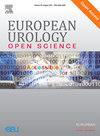Circulating Tumor DNA and Response to Cisplatin-based Chemotherapy in Patients with Metastatic Urothelial Carcinoma Enrolled in CALGB 90601 (Alliance)
IF 3.2
3区 医学
Q1 UROLOGY & NEPHROLOGY
引用次数: 0
Abstract
Background and objective
Cisplatin-based chemotherapy has been a cornerstone of therapy for advanced/metastatic urothelial cancer (mUC). However, no genomic characteristics have been validated as prognostic biomarkers for this therapy. We sought to identify prognostic biomarkers using plasma cell-free (cf)DNA collected in a phase 3 cooperative group trial.
Methods
We analyzed pretreatment cfDNA from a cohort nested in CALGB 90601 (Alliance), a first-line trial of gemcitabine/cisplatin with bevacizumab or placebo in mUC. We examined associations between cfDNA features and overall survival (OS), progression-free survival (PFS), and treatment response.
Key findings and limitations
Baseline cfDNA was sequenced from 201 patients with mUC. There was no statistically significant association between alterations in DNA damage response (DDR) genes and response to cisplatin-based chemotherapy (12/24; 50% response rate in DDR+ vs 60/145; 41% response rate in DDR−; p = 0.4), OS (hazard ratio [HR] 0.78, 95% confidence interval [CI] 0.50–1.22; p = 0.3) or PFS (HR 0.77, 95% CI 0.48–1.22; p = 0.3), although the DDR analysis was underpowered owing to the low frequency of DDR gene alterations. Higher variant allele frequency (VAF) in circulating tumor (ct)DNA was associated with shorter OS (HR 2.51, 95% CI 1.26–5.00; p = 0.009) and PFS (HR 2.18, 95% CI 1.02–4.67; p = 0.045). Shorter OS was associated with cfDNA alterations in TERT (HR 1.59, 95% CI 1.15–2.19; p = 0.005), PIK3CA (HR 1.91, 95% CI 1.20–3.04; p = 0.006), and ERBB2 (HR 1.64, 95% CI 1.08–2.49; p = 0.019).
Conclusions and clinical implications
Among patients with mUC treated with cisplatin-based chemotherapy, high pretreatment VAF in ctDNA and alterations in the TERT promoter, PIK3CA, and ERBB2 were associated with poor prognosis.
Patient summary
We looked at the link between tumor DNA present in blood and outcomes after chemotherapy for patients with advanced bladder cancer. Higher amounts of tumor DNA in blood and mutations in specific cancer genes were linked to worse survival. The results may help in the design of new studies to improve survival for patients with advanced bladder cancer.
This trial is registered on ClinicalTrials.gov as NCT00942331.
参加 CALGB 90601(联盟)的转移性尿路上皮癌患者的循环肿瘤 DNA 与对顺铂类化疗的反应
背景和目的以顺铂为基础的化疗已经成为晚期/转移性尿路上皮癌(mUC)治疗的基石。然而,没有基因组特征被证实为这种治疗的预后生物标志物。我们试图通过在3期合作组试验中收集的无浆细胞(cf)DNA来识别预后生物标志物。方法:我们分析了CALGB 90601 (Alliance)队列的预处理cfDNA, CALGB 90601是一项吉西他滨/顺铂联合贝伐单抗或安慰剂治疗mUC的一线试验。我们研究了cfDNA特征与总生存期(OS)、无进展生存期(PFS)和治疗反应之间的关系。主要发现和局限性来自201例mUC患者的基线cfDNA测序。DNA损伤反应(DDR)基因的改变与对顺铂化疗的反应之间无统计学意义的关联(12/24;DDR+组有效率为50% vs 60/145;DDR的有效率为41%;p = 0.4), OS(风险比[HR] 0.78, 95%可信区间[CI] 0.50-1.22;p = 0.3)或PFS (HR 0.77, 95% CI 0.48-1.22;p = 0.3),尽管由于DDR基因改变的频率较低,DDR分析的能力不足。循环肿瘤(ct)DNA中较高的变异等位基因频率(VAF)与较短的OS相关(HR 2.51, 95% CI 1.26-5.00;p = 0.009)和PFS (HR 2.18, 95% CI 1.02-4.67;p = 0.045)。较短的OS与TERT中cfDNA的改变相关(HR 1.59, 95% CI 1.15-2.19;p = 0.005), PIK3CA (HR 1.91, 95% CI 1.20-3.04;p = 0.006), ERBB2 (HR 1.64, 95% CI 1.08-2.49;p = 0.019)。结论及临床意义在接受顺铂化疗的mUC患者中,高预处理ctDNA VAF和TERT启动子、PIK3CA和ERBB2的改变与预后不良相关。我们研究了晚期膀胱癌患者化疗后血液中肿瘤DNA与预后之间的联系。血液中较高数量的肿瘤DNA和特定癌症基因的突变与较差的生存率有关。该结果可能有助于设计新的研究,以提高晚期膀胱癌患者的生存率。该试验在ClinicalTrials.gov上注册为NCT00942331。
本文章由计算机程序翻译,如有差异,请以英文原文为准。
求助全文
约1分钟内获得全文
求助全文
来源期刊

European Urology Open Science
UROLOGY & NEPHROLOGY-
CiteScore
3.40
自引率
4.00%
发文量
1183
审稿时长
49 days
 求助内容:
求助内容: 应助结果提醒方式:
应助结果提醒方式:


